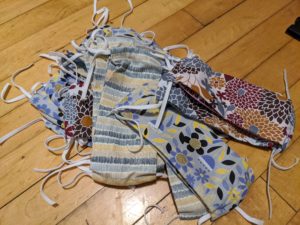On Deck
- Lesson Planning
- Portfolio Work
- Core Work

For folks who are nervous about balancing your work with managing your children’s education this fall/winter/spring, I’d like to impart some observations from my several years of homeschooling. It doesn’t matter if you’re a full-time or part-time worker, you’re a job seeker, or an intergenerational caregiver, you’re working.
Do not try to recreate the classroom in your home. It might be tempting (and a fun experience in consumerism!) to festoon your child’s work space with inspirational posters, educational banners, etc. that you now find everywhere, not just in the teacher-supply stores. Skip this. This stuff is distracting even in the classroom environment, much less in your home, particularly for kids with attention concerns. Keep it spare. What you should invest in is basic art materials, reams of paper, a bunch of pencils, etc. Consider getting them autoshipped on a schedule. Somehow, my couch has eaten at least a gross of pencils in two years.
Reinforce areas in need of development. Now is a great time to figure out the gaps in your kid’s knowledge. No school (public, private, or home) does it right all the time and children just develop blind spots in certain skills. To this day, I have no working knowledge of Roman numerals because I skipped this grade and never really went back and figured them out. I Google them every single time. There are easy assessments offered at low cost that you, a layperson, can use. Check out LetsGoLearn.com’s DORA or ADAM assessments in English Language Arts or math. They’re $25 and give you insights into where your kid needs some extra emphasis. You can also go to Khan Academy’s “Mappers” tool and plug in the NWEA/MAP scores your kid’s school is super focused on and you’ll get a customized learning plan for your child. It’s great.
Introduce new life skills. I’ve seen this tip a lot, and it’s completely key to your sanity and your child’s independence. They’re going to be all up in your business all day, eating snacks, making a mess, getting bored. And that’s okay—to an extent. I have been talking to my children about how this experience requires all of us to help in more intentional ways. Your workplace is a team, their classroom was a team, and this fall, your family is a team. Every second of every hour of every day in this pandemic. So, yeah, there will be more chores because there’s more life in the house. And life requires you to show up. Even you, little one. But it’s not all going to be all drudgery. You can teach them stuff you already know, have known for years, and tart it up as a treat. (That sounds so Mary Poppins, but it’s true and it’s all about marketing. Sidenote: the original Mary Poppins books are terrifying. Fun to read aloud!) Sewing on a button can be cool. Teaching your kid how to collect sticks, bark, and windfall branches so they can start a fire is totally cool. Showing them how to whisk properly (you’re doing it wrong and so am I; YouTube it and learn together) is cool.
Give each other grace. (Who am I, Brene Brown or something? Love her, but I’m not there yet.) But please hear me because I know what I’m talking about here. You will have crappy days. So will they. You will screw up. So will they. You will have days where you feel so competent and so together. And so will they. I follow (in part) a method formed by a 19th century English teacher called Charlotte Mason. She has many principles of education, but the one I cling to is that children are born persons. They were created by whomever with their own mystery. They’re separate from you at birth. So when you don’t allow them to have a shitty day, or a supreme day, you don’t acknowledge their personhood. And, friend, please hear me that when you don’t acknowledge your own needs, values, and gifts, you aren’t recognizing yours either. To me, the “giving grace” thing is about holding a space for empathy so you can observe more keenly, make thoughtful changes, and communicate with love and purpose. You’re going to have to figure out what that means with your family.
Be apart when you can. Hopefully, you’ve figured that out over the past few months. And from what I hear from friends, there’s been a LOT of device time. Be okay with that. If you weren’t already balancing working with schooling, the shift was too abrupt not to use devices. I learned how to read from TV commercials at age three, so I’m not throwing stones. But keep trying to introduce silence and solitude with your family. Try to take a quiet walk in nature. Do you own forest bathing. Between game noise, Zoom calls, TV sounds, you will need a bit of peace and quiet. Hopefully, you can find a bit of park, prairie, forest, or beach where you can go off in your own directions for a while sans device and just listen. Keep doing that, even into the crappiest part of winter. And buy your winter gear now. Triple up on the gloves.
Ultimately, this is going to be a lost year for many children. And that’s a shame—our shame. As a country, a city, etc. Our leaders failed us during the pandemic, and so many of our fellow citizens are not doing their best, either. We are living through a trauma, all of us. But for our smallest citizens, the pandemic is a generational wound. We need to think about this year differently. It’s never going to be the same again, but that doesn’t have to be a bad thing.
Good luck. And wash your hands.







